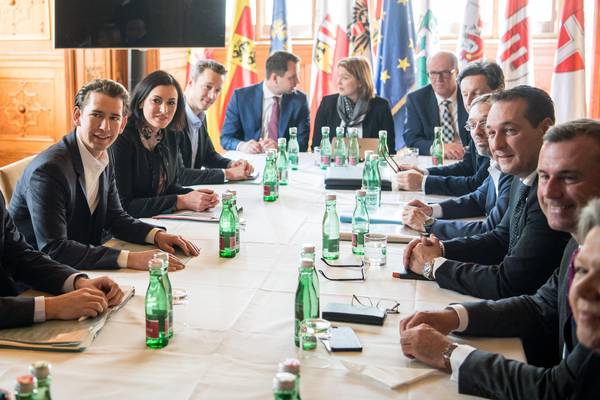Elections, Austria calls for radical change
Success was due to individual leaders
30 October, 19:20These elections have shown two trends of the national electorate. The first is the desire for a radical change in national policy and public administration. Kurz, who first revised the balance of powers within the People's Party, succeeded in presenting himself not only as a young and dynamic centre-right politician, who has no concern about his being close to the far right when coping with some issues (ie immigration and security), but also in terms of reform, since he's planning to change the old structure of the Second Austrian Republic. This is another "forte" of FPOE, which has been gaining supporters over the years, thanks to its desire to overthrow a republic largely perceived to be the result of decades of popular social-democratic rule.
Another important aspect of these elections is the success of electoral campaigns focused on personalities rather than parties. Kurz has been exemplary in this regard. The Party of Freedom has a long tradition of focus on the figure of the party leader, currently Heinz-Christian Strache, previously Joerg Haider. This is true even for Peter Pilz, who is held responsible for the electoral catastrophe of the Greens. As a former Green officer, he created a new personal party, which managed to enter the Vienna parliament with 4.4% of the vote, leaving the Greens below the 4% threshold. It is also worth mentioning Social Democrat Kern, who saved his party thanks to the assumption that he is the only one that can prevent a coalition between the Popular and Far Right Party from being formed. Many traditional Greens' supporters have followed this logic. Finally, the Liberals (NEOS, 5.3%) have also succeeded in joining the Nationalrat thanks to a charismatic candidate such as Matthias Strolz.
After the first post-election meetings, the coalition between the Popular and the Freedom Party is now being formed, and various coordination groups have been working on it over the last few days. The almost total lack of interlocutors who used to be 'typical' of Austrian politics (regional OEVP organizations and the so-called "social partners", such as trade unions and chambers of commerce) shows a change in the coalition negotiations.
Sebastian Kurz has never hidden his sympathy for a potential alliance with Fpoe. Surely there will be nothing comparable to the harsh international reaction against the first government of this kind, when a coalition between Wolfgang Schüssel and Joerg Haider's party was formed in 2000. Now the nationalist and populist right is weel-established across Europe. There are many measures that popular and FPOe can agree on, such as public administration reform, tax reduction or the end of compulsory membership of the Austrian Chamber of Commerce and Industry.
Although the details of these reforms are still unclear, it would be a radical change in the structure of the Austrian State.
It is still unknown what a coalition with a party like the FPOE is about. FPOE is essentially focused on internal politics, opposed to the European institutions and interested in fueling tensions and anxieties among Austrian citizens. While in recent weeks Strache and his party have repeatedly claimed to support the EU, there is still no exit from the European Parliament's Group of Nations and Liberty, gathering several anti-European members such as France's Front National. The president of the republic and former leader of the Greens, Alexander van der Bellen, said he would not accept the appointment of ministers who do not show respect for the EU values.(ANSA).














